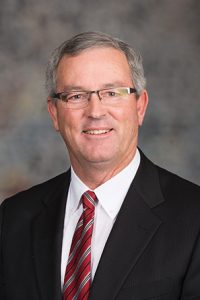Proposal to bar cities from banning single-use plastics discussed
Local governments could not ban single-use plastics and certain other materials under a bill heard Feb. 12 by the Natural Resources Committee.
Introduced by Sen. Dan Hughes of Venango, LB861 would prohibit a county, municipality or agency from adopting, enforcing or administering an ordinance or resolution that prohibits the use of or sets standards, fees or requirements regarding the sale, use or marketing of “consumer merchandise and containers.”
The prohibition would not apply to county, municipality or agency recycling or solid waste collection programs.
The bill defines consumer merchandise, in part, as merchandise that is offered for or provided with sale or lease and “any container used for consuming, carrying, or transporting such merchandise.”
It defines a container as a single-use or reusable bag, cup, package, container, bottle or other packaging made of cloth, paper, plastic, cardboard, aluminum, glass or certain other materials and that is “designed for consuming, protecting or transporting merchandise, food or beverages from or at a food service or retail facility.”
Hughes said LB861 would ensure that Nebraska businesses are not burdened by varying or conflicting regulations on those materials in different jurisdictions. He said local governments have considered bans or taxes on plastic bags, bottles, cups, cutlery and other items that, if enacted, would subject businesses to a regulatory “amalgamation.”
“It would have made it impossible for them to comply with regulations within their communities, across state lines and the global economy,” he said.
Additionally, Hughes said, LB861 would encourage manufacturing methods that reduce waste by creating products that are adaptable to secondary uses through processes such as biomass and pyrolysis, the decomposition of materials at high temperatures.
Jim Otto testified in support of the bill on behalf of the Nebraska Retail Federation and the Nebraska Restaurant Association. Otto said “patchwork regulation” complicates container distribution and increases costs for retailers and restaurants.
“It is our position that something this important deserves statewide attention and that the passage of LB861 will encourage the development of a well-thought-out and comprehensive statewide recycling policy,” he said.
Dale Gubbels, president of an Omaha recycling company, also testified in support. He said pyrolysis can help reduce the amount of plastic sent to landfills by turning it into diesel fuel, heating oil and naphtha, from which new plastic products can be made.
“This would be an in-state end market for something that we’re now paying easily $20 million a year to landfill,” Gubbels said.
Also testifying in support was Kathy Siefken of the Nebraska Grocery Industry Association. She said bans on single-use plastic bags, such as the one passed by the Omaha city council and vetoed by Omaha’s mayor last year, make “winners and losers” of stores based on what they sell and ignore the fact that plastic bags take fewer resources to make than paper bags.
“The single-use plastic bag is an environmentally friendly item that … should not be banned in local areas,” Siefken said.
Ron Sedlacek testified in support of LB861 on behalf of the Nebraska Chamber of Commerce and Industry, the National Federation of Independent Business in Nebraska, the Greater Omaha Chamber and the Lincoln Chamber of Commerce.
Sedlacek said the bill would create a “friendly climate” for Nebraska retailers as well as manufacturers, processors and distributors. He said approximately 20 states including Colorado, Iowa and Missouri have enacted some type of statewide regulation on containers and packaging.
Michael J. O’Hara testified in opposition to LB861 on behalf of the Nebraska chapter of the Sierra Club. He said retailers want a “ban on bans” and opposed statewide regulation under another bill introduced this session that would impose a 5-cent fee on single-use plastic bags.
“No regulation is not statewide regulation,” O’Hara said, “and that’s what this would propose.”
Megan Jackson testified in opposition to the bill on behalf of the Nebraska Recycling Council, saying it would strip away cities’ authority to regulate or manage plastic pollution in their communities.
She said cities may have a number of reasons to ban or regulate a particular product, such as the desire to mitigate litter’s effects on ecosystems or wildlife, improve public health or reduce toxins.
“This bill isn’t proposing a solution at all,” she said. “It’s just limiting our own local governments from creating their own innovative solutions for reduction and recycling.”
The committee took no immediate action on the bill.

